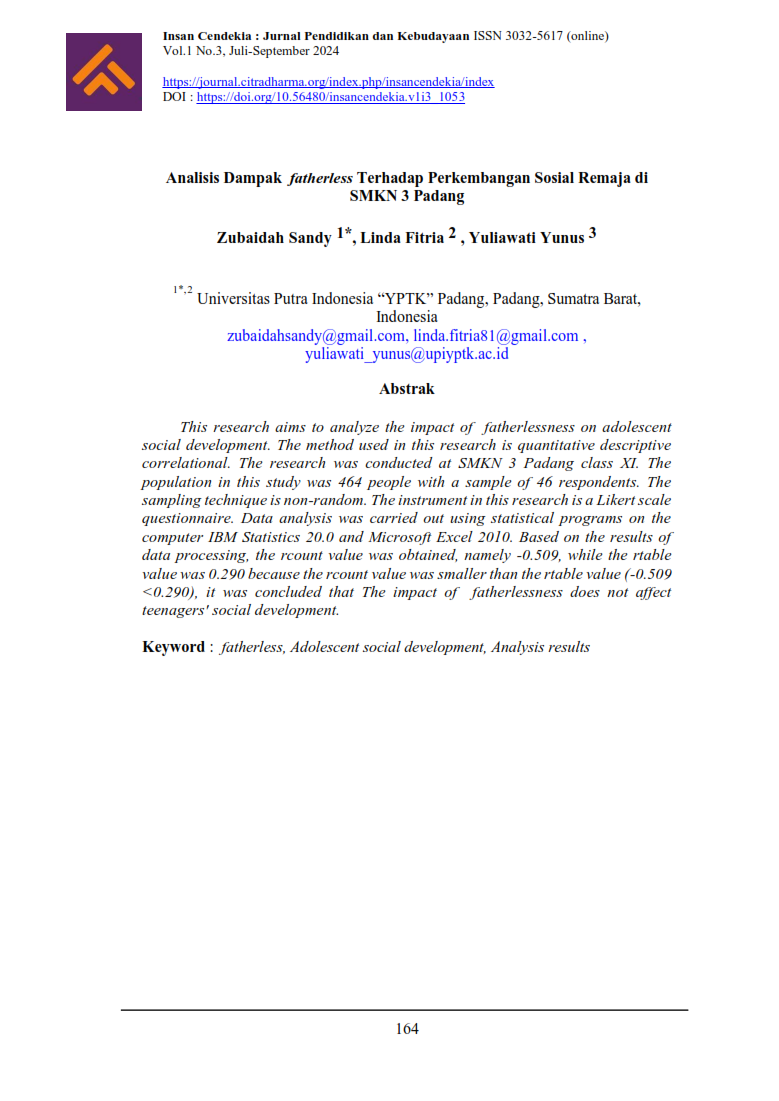Analisis Dampak Fatherless Terhadap Perkembangan Sosial Remaja di SMKN 3 Padang
DOI:
https://doi.org/10.56480/insancendekia.v1i3.1053Keywords:
Fatherless, Adolescent social development, Analysis resultsAbstract
This research aims to analyze the impact of fatherlessness on adolescent social development. The method used in this research is quantitative descriptive correlational. The research was conducted at SMKN 3 Padang class XI. The population in this study was 464 people with a sample of 46 respondents. The sampling technique is non-random. The instrument in this research is a Likert scale questionnaire. Data analysis was carried out using statistical programs on the computer IBM Statistics 20.0 and Microsoft Excel 2010. Based on the results of data processing, the rcount value was obtained, namely -0.509, while the rtable value was 0.290 because the rcount value was smaller than the rtable value (-0.509 <0.290), it was concluded that The impact of fatherlessness does not affect teenagers' social development.
References
Amato, P. R., & Anthony, C. J. (2022). Perceraian, konflik perkawinan, dan kesejahteraan anak: sebuah meta-analisis. Proses keluarga, 55(1), 1-17.
Arie Rihardini Sundari dan Febi Herdajani, 2013, “Dampak fatherless Terhadap Perkembangan Psikologis Anak”, Jurnal Prosiding Seminar Nasional Parenting 2013, Fakultas Psikologi, Universitas Persada Indonesia YAI, h. 256
Arnett, J. J. (2019). Adolescence and emerging adulthood. Pearson.
Asy’ari, H., & Ariyanto, A. (2019). Gambaran keterlibatan ayah dalam pengasuhan anak (Paternal Involvement) di jobodetabek. Jurnal Psikologi Ilmiah, 11 (1). 37-44.
Brown, B. B., & Larson, J. (2019). Peer relationships in adolescence. In R. M. Lerner & L. Steinberg (Eds.), Handbook of adolescent psychology (3rd ed., pp. 74-103). John Wiley & Sons.
Carlson, M. J. (2019). Family structure, father involvement, and adolescent behavioral outcomes. Journal of Marriage and Family, 68(1), 137-154.
Crone, E. A., & Dahl, R. E. (2022). Understanding adolescence as a period of social-affective engagement and goal flexibility. Nature Reviews Psychology, 1(4), 255-271.
Dasalinda, Dwi, and Yeni Karneli. "Hubungan fatherless Dengan Penyesuaian Sosial Remaja Implementasi Pelaksanaan Layanan Bimbingan Konseling Di Sekolah." Counsenesia Indonesian Journal Of Guidance and Counseling 2.02 (2021): 98-105.
Diananda, Amita. "Psikologi remaja dan permasalahannya." ISTIGHNA: Jurnal Pendidikan dan Pemikiran Islam 1.1 (2019): 116-133.
Eisenberg, N., Spinrad, T. L., & Knafo-Noam, A. (2015). Prosocial development. In M. E. Lamb & R. M. Lerner (Eds.), Handbook of child psychology and developmental science (7th ed., Vol. 3, pp. 610-656). Wiley.
Hurlock, E. B. (2018). Developmental psychology: A life-span approach (6th ed.). McGraw-Hill.
Hurlock, E. B. (2023). Developmental Psychology: A Life-Span Approach (8th ed.). New Delhi, India: McGraw-Hill Education
Juvonen, J., & Graham, S. (2022). Peer relationships and adjustment at school. In W. M. Bukowski, B. Laursen, & K. H. Rubin (Eds.), Handbook of peer interactions, relationships, and groups (2nd ed., pp. 527-547). Guilford Press.
Kementerian Kesehatan Republik Indonesia. (2014). Peraturan Menteri Kesehatan Republik Indonesia Nomor 25 Tahun 2014 tentang Upaya Kesehatan Anak. Jakarta: Kementerian Kesehatan RI.
Khairuddin. "Sosiologi Keluarga". Yogyakarta: Liberty, 2022.
Lamb, M. E., & Lewis, C. (2020). The role of parent-child relationships in child development. Wiley-Blackwell.
Nurhayani. (2020). Eksistensi peran ayah dalam menyiapkan generasi muslim yang shaleh. Jurnal Pendidikan dan Keislaman, 3 (1). 1-19.
Olson, D. H., & DeFrain, J. (2021). Marriages and families: Intimacy, diversity, and strengths (9th ed.). McGraw-Hill Education.
Papalia, D. E., & Martorell, G. (2021). Experience human development (14th ed.). McGraw-Hill Education.
Prayitno, Duwi. (2018). Dasar-Dasar Statistika untuk Penelitian. Yogyakarta: Penerbit Laksana.
Santrock, J. W. (2019). Adolescence (17th ed.). McGraw-Hill Education
Sarlito Wirawan Sarwono. "Psikologi Remaja". Jakarta: Rajawali Pers, 2021.
Schwartz, S. J., Zamboanga, B. L., Cano, M. Á., & Rivas-Drake, D. (2022). Cultural processes and mechanisms in adolescent development. Child Development Perspectives, 16(1), 56-62.
Siti Maryam Munjiat, Pengaruh fatherless Terhadap Karakter Anak Dalam Perspektif Islam, h. 111
Sugiyono. (2017). Metode Penelitian Kuantitatif, Kualitatif, dan R&D. Bandung: Alfabeta.
Tirtawinata, Christofora Megawati. "Mengupayakan keluarga yang harmonis." Humaniora 4.2 (2013): 1141-1151.
Utami, Azhary Pangestu. Analisis Dampak fatherless Pada Kenakalan Remaja SMAN di Jakarta Timur. BS thesis. Jakarta: FITK UIN Syarif Hidayatullah Jakarta, 2021.
Wandansari, A., Nur, H., & Siswanti, D. N. (2021). Ketidakhadiran Ayah Bagi Remaja Putri. Jurnal Psikologi Talenta Mahasiswa, 1 (2). 80-92.
Worden, J. W., & Silverman, P. R. (2020). Parental death and the family life-cycle. Omega, 20(3), 227-241.
World Health Organization (WHO). (2022). Adolescent health. https://www.who.int/health-topics/adolescent-health#tab=tab_1

Downloads
Published
Issue
Section
License
Copyright (c) 2024 Zubaidah Sandy, Linda Fitria, Yuliawati Yunus

This work is licensed under a Creative Commons Attribution-ShareAlike 4.0 International License.
Deprecated: json_decode(): Passing null to parameter #1 ($json) of type string is deprecated in /home/citra-dharma-journal/public_html/plugins/generic/citations/CitationsPlugin.inc.php on line 49





